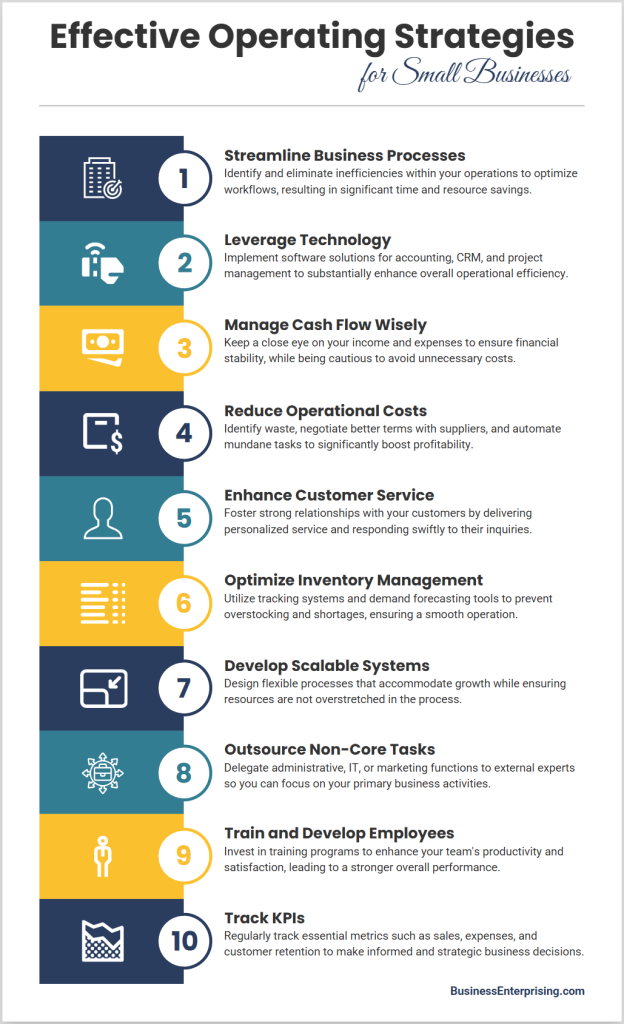
Understanding Business Operations and Efficiency
Understanding business operations is essential for your small business’s success. Operations encompass the daily activities that keep your business running smoothly. These include managing resources, overseeing production, and ensuring customer satisfaction. By focusing on these areas, you can develop effective operating strategies for small businesses.
Streamlining workflows plays a significant role in enhancing efficiency. When you simplify processes, you reduce time spent on tasks and minimize errors. This leads to increased productivity and cost savings. For instance, automating routine tasks can free up time for you and your team to focus on more critical activities.
Moreover, clear communication within your team ensures everyone understands their roles and responsibilities. This clarity reduces redundancies and prevents tasks from being overlooked. Regularly reviewing and updating your processes allows you to identify bottlenecks and implement improvements promptly.
Incorporating technology can further streamline your operations. Utilizing project management tools helps in tracking progress and meeting deadlines. Additionally, digital platforms can facilitate better inventory management and customer relationship management.
By focusing on these operational aspects and continuously seeking ways to improve, your small business can achieve greater efficiency and productivity. This approach not only enhances your current operations but also lays a strong foundation for future growth.
Financial Management and Cost Control
Effective financial management is essential for your small business’s success. Developing a comprehensive budget allows you to allocate resources wisely and plan for future expenses. By monitoring your cash flow, you can anticipate shortfalls and take proactive measures to maintain stability. Implementing these operating strategies for small businesses can lead to sustainable growth.
To reduce operational costs without compromising quality, consider streamlining your processes. Automating routine tasks can save time and minimize errors. Additionally, negotiating with suppliers may result in better terms, lowering expenses. Regularly reviewing expenses helps identify areas where you can cut costs without affecting product or service quality.
Furthermore, adopting technology can enhance efficiency. Utilizing project management tools aids in tracking tasks and deadlines, ensuring timely completion. Digital solutions for inventory management can prevent overstocking, reducing storage costs. By embracing these methods, you can maintain high standards while controlling expenses.
Diligent budgeting and cash flow management are key to your financial health. By focusing on cost-effective strategies and leveraging technology, your small business can thrive without sacrificing quality.
Technology and Automation in Small Business Operations
Integrating technology and automation into your small business operations can significantly enhance efficiency. Implementing software solutions like Customer Relationship Management (CRM), accounting, and project management tools streamlines various processes. These tools help manage customer interactions, financial records, and project timelines more effectively. Consequently, you can allocate more time to strategic activities that drive growth.
Moreover, adopting artificial intelligence (AI) and automation tools offers additional advantages. Automating repetitive tasks reduces human error and increases productivity. For instance, AI-powered chatbots can handle customer inquiries, providing prompt responses and freeing up your staff for more complex issues. Additionally, AI can analyze data patterns, offering insights that inform better decision-making. By leveraging these technologies, you can optimize your operating strategies for small businesses, leading to improved performance and competitiveness.
Furthermore, automation facilitates better resource management. Automated inventory systems track stock levels in real-time, preventing overstocking or stockouts. This ensures you meet customer demand without tying up capital in excess inventory. Additionally, automating marketing campaigns allows for personalized customer engagement, enhancing customer satisfaction and loyalty. By embracing technology and automation, you position your small business for sustained success in a competitive market.
Customer Service and Relationship Management
Building a customer-centric approach is essential for your small business’s success. By focusing on your customers’ needs and preferences, you can enhance satisfaction and foster loyalty. This strategy involves understanding your customers deeply and aligning your services to meet their expectations. Such operating strategies for small businesses can lead to sustained growth.
To retain and grow a loyal customer base, consider implementing personalized experiences. Addressing customers by their names in communications and offering tailored recommendations can make them feel valued. Additionally, providing exceptional customer service is crucial. Respond promptly to inquiries and resolve issues efficiently to build trust. Regular engagement through newsletters or social media updates keeps your brand top-of-mind. Moreover, loyalty programs can incentivize repeat business by rewarding customers for their continued patronage. By adopting these strategies, you can strengthen customer relationships and encourage long-term loyalty.
Inventory and Supply Chain Management
Efficient inventory and supply chain management are essential operating strategies for small businesses. By implementing best practices, you can optimize stock levels and also reduce costs. One effective method is the First-In, First-Out (FIFO) approach, which involves selling older inventory first to minimize waste. Additionally, regularly monitoring stock levels and conducting audits can prevent overstocking and stockouts. Utilizing inventory management software provides real-time tracking, aiding in accurate demand forecasting and timely reordering.
Partnering with reliable suppliers is equally important for cost-effective operations. Establishing strong relationships with suppliers can lead to better pricing and more favorable terms. Clear communication ensures that both parties understand expectations and can address issues promptly. Moreover, collaborating with suppliers can lead to process improvements and cost savings for both parties. By focusing on these strategies, your small business can maintain efficient operations and a competitive edge.
Scalability and Growth Strategies
Scaling your small business requires careful planning and execution. Begin by assessing your current operations to identify areas for improvement. Streamlining processes can enhance efficiency and also prepare your business for growth. Additionally, investing in technology, such as automation tools, can help manage increased demand without significantly raising costs. These steps are fundamental operating strategies for small businesses aiming to scale effectively.
To expand without overextending resources, consider leveraging strategic partnerships. Collaborating with complementary businesses allows you to tap into new customer bases and share resources, reducing the strain on your operations. Furthermore, outsourcing non-core tasks can free up your team’s time to focus on primary business activities. Regularly reviewing your financials ensures that growth initiatives align with your budget, preventing unnecessary expenditures.
Maintaining flexibility is also crucial during expansion. Being adaptable enables you to respond swiftly to market changes and customer needs. By implementing these strategies thoughtfully, your small business can achieve sustainable growth without compromising stability.
Conclusion
In conclusion, adopting effective operating strategies for small businesses is essential for achieving sustainable growth and success. By focusing on efficient operations, sound financial management, and customer-centric approaches, you can enhance your business’s performance. Additionally, leveraging technology and forming strategic partnerships can further streamline processes as well as reduce costs.
As you implement these strategies, remember to monitor progress and remain adaptable to changing market conditions. This proactive approach will help your small business thrive in a competitive environment.



